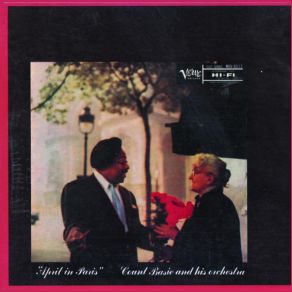April In Paris
Download links and information about April In Paris by Count Basie. This album was released in 1956 and it belongs to Jazz, Easy Listening genres. It contains 17 tracks with total duration of 01:07:27 minutes.

|
|
|---|---|
| Artist: | Count Basie |
| Release date: | 1956 |
| Genre: | Jazz, Easy Listening |
| Tracks: | 17 |
| Duration: | 01:07:27 |
| Buy it NOW at: | |
| Buy on iTunes $9.99 | |
| Buy on iTunes $5.99 | |
| Buy on iTunes $10.99 | |
| Buy on Amazon $9.49 | |
| Buy on Amazon $0.99 | |
| Buy on Amazon $1.29 | |
| Buy on Amazon $1.29 | |
| Buy on Amazon $32.65 | |
| Buy on Amazon $7.56 | |
| Buy on Amazon $0.01 | |
| Buy on iTunes $9.99 | |
Tracks
[Edit]| No. | Title | Length |
|---|---|---|
| 1. | April In Paris (Instrumental) (featuring Quincy Jones, Quincy Jones And His Orchestra) | 3:47 |
| 2. | Corner Pocket (1955 Version) (featuring Quincy Jones, Quincy Jones And His Orchestra) | 5:14 |
| 3. | Didn't You? | 4:43 |
| 4. | Sweetie Cakes | 3:58 |
| 5. | Magic | 3:06 |
| 6. | Shiny Stockings | 5:14 |
| 7. | What Am I Here For? | 3:19 |
| 8. | Midgets | 3:13 |
| 9. | Mambo Inn | 3:23 |
| 10. | Dinner With Friends | 3:05 |
| 11. | April In Paris (Alternate Take) | 3:48 |
| 12. | Corner Pocket (Alternate Take) | 4:59 |
| 13. | Didn't You? (Alternate Take) | 4:49 |
| 14. | Magic (Alternate Take) | 3:42 |
| 15. | Magic (Alternate Take) | 3:50 |
| 16. | What Am I Here For? (Alternate Take) | 4:06 |
| 17. | Midgets (Alternate Take) | 3:11 |
Details
[Edit]
With rock ’n’ roll eclipsing big bands by the ’50s, even the greatest of bandleaders faced a period of reassessment, and Bill “Count” Basie was no exception. Thankfully Norman Granz and Verve Records did much to extend Basie’s reign in the postwar period. And with the arrival of fresh band members—very fine composer-arrangers among them—Basie’s “New Testament” period was off and running. April in Paris was one of the landmarks, and the centerpiece was “Wild Bill” Davis’ arrangement of the Vernon Duke/”Yip” Harburg title track, with its easy glide and over-the-top false endings (“let’s try it one more once!”).
Basie’s “Old Testament” lineup of the mid-’30s had defined the Kansas City jazz sound and loosed the incredible Lester Young on the world. The Basie band of April in Paris could swing as hard (hear Joe Newman’s “Midgets” and Frank Wess’ “Magic”), but the aesthetic was generally more polished, the songs more written, than the spontaneous “head arrangements” of yore. Frank Foster’s “Shiny Stockings,” with a swing feel so relaxed it floats, is a key example. Foster also wrote “Didn’t You?” and arranged Ellington’s “What Am I Here For?” and Mario Bauzá’s “Mambo Inn,” while fellow saxophonist Ernie Wilkins, a force in his own right, contributed “Sweetie Cakes.” Entries from Old Testament rhythm guitar veteran Freddie Green (“Corner Pocket”) and the great Neal Hefti (“Dinner with Friends”) round it out. Trumpeter Thad Jones, trombonist Benny Powell, and other superb talents began to emerge under Basie’s wing.
Basie’s “Old Testament” lineup of the mid-’30s had defined the Kansas City jazz sound and loosed the incredible Lester Young on the world. The Basie band of April in Paris could swing as hard (hear Joe Newman’s “Midgets” and Frank Wess’ “Magic”), but the aesthetic was generally more polished, the songs more written, than the spontaneous “head arrangements” of yore. Frank Foster’s “Shiny Stockings,” with a swing feel so relaxed it floats, is a key example. Foster also wrote “Didn’t You?” and arranged Ellington’s “What Am I Here For?” and Mario Bauzá’s “Mambo Inn,” while fellow saxophonist Ernie Wilkins, a force in his own right, contributed “Sweetie Cakes.” Entries from Old Testament rhythm guitar veteran Freddie Green (“Corner Pocket”) and the great Neal Hefti (“Dinner with Friends”) round it out. Trumpeter Thad Jones, trombonist Benny Powell, and other superb talents began to emerge under Basie’s wing.